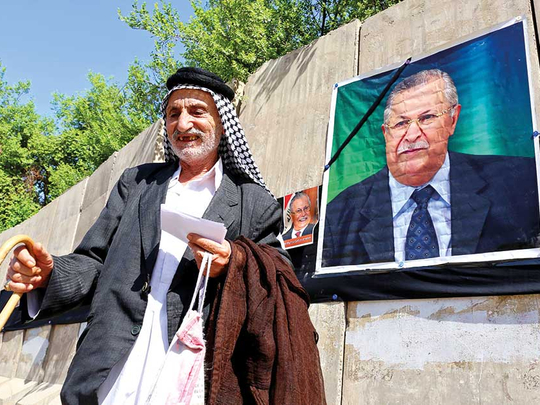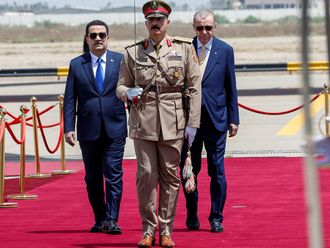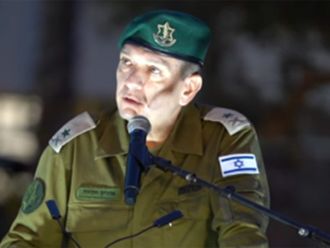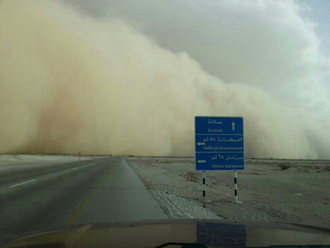
New York: Jalal Talabani the Kurdish leader who used pragmatism, guile and an outsize personality to navigate a hazardous course in Mideast politics, surviving guerrilla war, the terrors of Saddam Hussain and shifting alliances to become the first president of Iraq under its postwar constitution, died on Tuesday in Berlin. He was 83.
The cause was a brain haemorrhage and a stroke, his second since 2012, according to Saadi Bira, a spokesman for Talabani’s Patriotic Union of Kurdistan.
The Iraqi presidency, on paper, is largely ceremonial. But Talabani, through skilful bridge-building, used his tenure in office, from 2005 to 2012, to act as a chief executive with a broad and powerful portfolio.
President George W. Bush’s administration saw Talabani as an important ally, though at times he was a harsh critic of US policies and military tactics. The Obama White House was also quick to reach out to him. Michael Rubin, editor of Middle East Quarterly, reported that “less than two weeks into his presidency,” President Barack Obama telephoned Talabani “to discuss the way ahead.’’
Talabani was long an ardent campaigner for a sovereign Kurdish state in northern Iraq, where his political beginnings, like his family, were rooted. But he submerged many of those aspirations in his later years as he worked to unify the factions that contested for power after the fall of Saddam in 2003.
Talabani was a member of the Iraqi Governing Council, which drafted the country’s interim constitution after the war. The National Assembly named him interim president in April 2005, to succeed Ghazi Mashal Ajil Al Yawer. A year later he became the first president to be elected under the new constitution.
As the war in Iraq wound down in 2010, Talabani figured in the Obama administration’s plans for a postwar government there. In their 2012 book, “The Endgame: The Inside Story of the Struggle for Iraq, from George W. Bush to Barack Obama,” Michael R. Gordon, a former correspondent for The New York Times, and retired Lt. Gen. Bernard E. Trainor wrote that Obama made a confidential call to Talabani asking him to give up the Iraqi presidency so that a more inclusive government might be formed under Ayad Allawi, a Shiite with broad Sunni support. The administration’s aim, the authors wrote, was to counter what the White House saw as a drift toward authoritarianism under Prime Minister Nouri Al Maliki.
Talabani refused. He was re-elected a week later.
Talabani, widely known as Mam Jalal or Uncle Jalal, cut a Falstaffian figure, typically in bespoke suits. A rotund, gregarious gourmand, he enjoyed nothing so much as a bountiful table and Cuban cigars as he grew wealthy from duties on oil exported illegally through Turkey.
His health was not as robust. He collapsed from exhaustion in February 2007, and a US military plane took him to a hospital in Amman, Jordan. He returned home after 17 days, but that May he went to the Mayo Clinic in Rochester, Minnesota, for rest and treatment for what he called “my obesity.’’ In the summer of 2008, he returned to the Mayo Clinic for an operation to repair a heart valve. Then came the stroke, at the end of 2012, when he was flown to Germany for treatment.
Talabani was a consummate political survivor and an openhanded pragmatist, if not an ideological chameleon, adept at maintaining his equilibrium in the sectarian, often ruthless environment of postwar Iraq. He was quite capable of startling marriages of political convenience, some ending in equally expedient divorce.
After the Islamic revolution brought Ayatollah Khomeini to power in Iran in 1979, for example, Talabani backed the Iranian Kurds against the regime in Tehran. Later, he allied himself with the Tehran government in its war with Baghdad.
In a 2007 profile in The New Yorker by Jon Lee Anderson, Iraq’s national security adviser, Shiite politician Mowaffak Al Rubaie, was quoted as calling Talabani “very difficult to define.”
“If you are an Islamist, he brings you Quranic verses; if you’re a Marxist, he’ll talk to you about Marxist-Leninist theory, dialectics and Descartes,” the article quoted Al Rubaie as saying. “He has a very interesting ability to speak several languages, sometimes with a very limited vocabulary. He has a lot of anecdotes and knows a lot of jokes. He is an extraordinarily generous person, and he spends like there’s no tomorrow.”
Jalal Talabani was born on Nov. 12, 1933, in the northeastern Kurdish village of Kelkan, near Suleimaniya. The Talabani clan was a powerful one, and his father was one of its leaders. Jalal’s political life started early. At 13 he joined a clandestine group of Kurdish students in what was then British-ruled Iraq. At 18 he was among the ranking members of the Kurdistan Democratic Party, led by Mustafa Barzani.
Talabani attended law school at Baghdad University but withdrew to evade arrest for his role in founding the Kurdistan Student Union. He travelled to China in 1955, met Premier Zhou Enlai and translated writings of Mao Zedong — his political role model — into Kurdish.
He returned to Iraq after the fall of the Hashemite monarchy in 1958 and graduated from law school the next year. In 1961, after his compulsory service in the Iraqi Army, he joined a Kurdish independence uprising led by Barzani.
Talabani served Barzani as an overseas envoy, living first in Lebanon and later in Syria. He also travelled through Europe and the Mideast, establishing political friendships with Muammar Gaddafi of Libya, Jamal Abdul Nasser of Egypt, Palestinian leader Yasser Arafat, King Hussain of Jordan and Hafez Al Assad of Syria.
Talabani quit and rejoined the Kurdistan Democratic Party several times before splitting with Barzani and switching his allegiance to a splinter group led by politician and novelist Ibrahim Ahmed. Talabani married Ahmad’s daughter, Hero, in 1970. In 1975, he united several Kurdish groups into a new party, the Patriotic Union of Kurdistan.
An avowed Marxist and Maoist, Talabani was angry that the United States had initially sided with Iraq, and Saddam, during the Iran-Iraq War, which lasted from 1980 to 1988.
With the war winding down in the spring of 1988, Talabani slipped out of Iraq through Iran to make his first trip to the United States.
His trip was primarily intended to accuse Saddam’s regime of genocide in using chemical weapons against the Kurds. The previous March, a gas attack on the Kurdish village of Halabja left an estimated 5,000 people dead. Talabani was the principal messenger to the West about the massacre, which was largely unreported at the time. He spoke at the United Nations, to politicians in Washington and to the media.
Despite the massacre and the army’s campaign of repression against the Kurds, Talabani and Barzani’s son Massoud, who by then had taken over leadership of the KDP, travelled to Baghdad to sue for peace. Talabani later described a series of warm meetings with Saddam, but he made a rare political misstep when he was photographed kissing the hated Iraqi president on the cheek.
A no-fly zone imposed by the United States and its allies in the Kurdish north gave the Kurds a relatively safe haven beyond the reach of Baghdad. But intramural Kurdish hatreds began to resurface, and by 1994 Talabani’s forces were engaged in a civil war with Barzani’s. (Twice Barzani appealed to Saddam for help.)
The two men reconciled in 1997 and built an uneasy peace, fortified by the US-led invasion in 2003. The rapprochement proved enduring enough that the parties fielded a joint list of candidates in the country’s first national elections, in 2005.
Talabani is survived by his wife, who owns a television station and a newspaper in Suleimaniya; their two sons, Bafel, who works in counterinsurgency for the Patriotic Union on Kurdistan, and Qubad, the deputy prime minister of the Kurdistan Regional Government; and three grandchildren. His wife and children were in Germany with him when he died, according to a spokesman for his party.
Talabani for years lived with declining health. He underwent heart surgery in the United States in 2008, and in December 2012 he had his first stroke. He flew from Iraq to Germany for extended medical treatment. From Berlin, he cast a vote in parliamentary elections in April 2014, the country’s first since the withdrawal of US forces in 2011.
He only returned to Iraq in July 2014. He resigned his post as president soon after, in part due to his weakened physical condition, which included partial paralysis.
In September, he returned to Berlin seeking further medical care.
Iraq’s prime minister, Haider Al Abadi, during his weekly news conference, extended his condolences to Talabani’s family and to all Iraqis for the loss of the nation’s first non-Arab president.
Talabani’s penchant for quicksilver diplomatic expediency was on display in his relationship with Iran. After the invasion of Iraq in 2003, he spoke harshly about Iranian meddling in Iraqi politics. But by March 2008 he had softened toward his country’s neighbour and former enemy. That was when President Mahmoud Ahmadinejad of Iran made the first trip to Baghdad by an Iranian leader in a quarter century. After his plane landed, Ahmadinejad went straight from the airport to Talabani’s personal compound.












